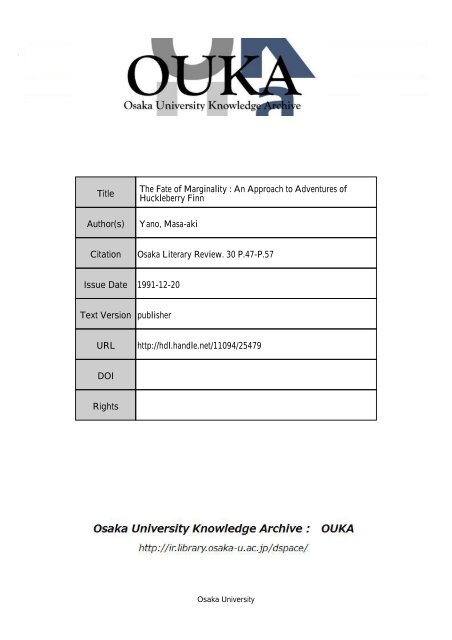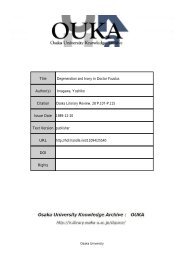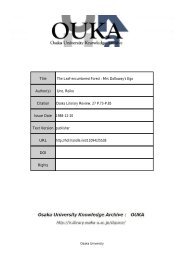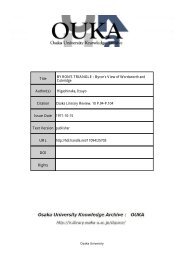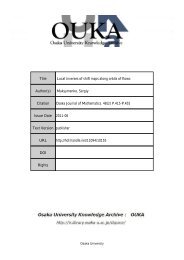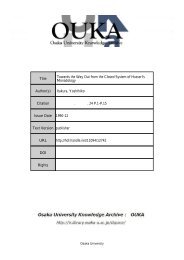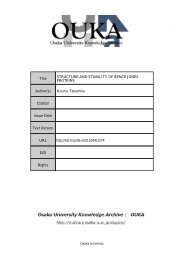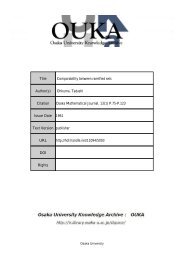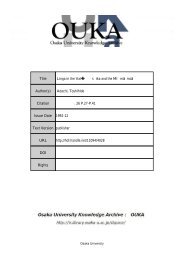Title The Fate of Marginality : An Approach to ... - Osaka University
Title The Fate of Marginality : An Approach to ... - Osaka University
Title The Fate of Marginality : An Approach to ... - Osaka University
Create successful ePaper yourself
Turn your PDF publications into a flip-book with our unique Google optimized e-Paper software.
<strong>Title</strong><br />
<strong>The</strong> <strong>Fate</strong> <strong>of</strong> <strong>Marginality</strong> : <strong>An</strong> Approa<br />
Huckleberry Finn<br />
Author(s) Yano, Masa-aki<br />
Citation <strong>Osaka</strong> Literary Review. 30 P.47-P.57<br />
Issue 1991-12-20<br />
Date<br />
Text Version<br />
publisher<br />
URL<br />
http://hdl.handle.net/11094/25479<br />
DOI<br />
Rights<br />
<strong>Osaka</strong> <strong>University</strong>
<strong>The</strong> <strong>Fate</strong> <strong>of</strong> <strong>Marginality</strong>:<br />
<strong>An</strong> <strong>Approach</strong> <strong>to</strong> Adventures <strong>of</strong> Huckleberry<br />
Finn<br />
Masa-aki Yano<br />
I<br />
Mark Twain's prime as a writer approximately coincides with the<br />
"Gilded Age ." In this age, capitalism <strong>of</strong> the. United States developed<br />
rapidly. American national ideal suffered a change in quality. According<br />
<strong>to</strong> the traditional "American Myth," America was supposed <strong>to</strong> be a new<br />
world. Everyone can restart one's life and attain happiness there. Originally,<br />
the "happiness" had a kind <strong>of</strong> moral implication. In the Gilded<br />
Age, however, the situation changed. <strong>The</strong> "happiness" was identified<br />
with economic success. For Mark Twain's contemporary Americans, the<br />
common goal in life was <strong>to</strong> get rich quick with one's talent and effort.<br />
<strong>The</strong> "American Myth" seemed <strong>to</strong> support this type <strong>of</strong> success s<strong>to</strong>ry.<br />
Mark Twain's two "boy's s<strong>to</strong>ry," <strong>The</strong> Adventures <strong>of</strong> Tom Sawyer<br />
and Adventures <strong>of</strong> Huckleberry Finn, were written in this his<strong>to</strong>rical context.<br />
<strong>The</strong> situation <strong>of</strong> the Gilded Age was projected in<strong>to</strong> these novels.<br />
But each <strong>of</strong> them gives rather different impression <strong>to</strong> the reader. <strong>The</strong><br />
basic <strong>to</strong>ne is not same. <strong>The</strong> protagonists, Tom and Huck, also seem <strong>to</strong><br />
be contrastive.<br />
<strong>The</strong> aim <strong>of</strong> this paper is <strong>to</strong> consider whether this contrast is real<br />
one or not. It will help <strong>to</strong> understand the unique significance <strong>of</strong> Adventures<br />
<strong>of</strong> Huckleberry Finn.<br />
II<br />
Tom Sawyer's personality is made clear, in the first some chapters<br />
<strong>of</strong> <strong>The</strong> Adventures <strong>of</strong> Tom Sawyer. <strong>The</strong> "fight" episode shows his aggressiveness<br />
(chapter 1). <strong>The</strong> fence whitewashing episode shows that<br />
47
48 <strong>The</strong> <strong>Fate</strong> <strong>of</strong> <strong>Marginality</strong><br />
he well understands human nature (chapter 2). <strong>The</strong> ticket collecting<br />
episode shows that he can make a pr<strong>of</strong>itable deal (chapter 4). Tom<br />
has a good ability <strong>of</strong> business.<br />
In the middle part <strong>of</strong> this novel, chapter 25, this boy wants <strong>to</strong> search<br />
for the "hidden treasure." He chooses Huck as a partner. Each <strong>of</strong> them<br />
talks <strong>of</strong> his own dream. If they successfully find the treasure, Tom says,<br />
he will "save" it and "have something <strong>to</strong> live on, by and by." <strong>An</strong>d then,<br />
he will lead such a life: "I'm going <strong>to</strong> buy a new drum, and a sure-'nough<br />
sword, and a red neck-tie and a bull pup, and get married."1) This childish<br />
dream has some traces <strong>of</strong> the middle class life. Tom has the common<br />
ideal with the respectability <strong>of</strong> the society.<br />
Later in the s<strong>to</strong>ry, Tom experiences an adventure. Tom and Becky<br />
Thatcher go <strong>to</strong> the McDougal's cave on a picnic, and lose their way in<br />
it. In this critical situation, Tom never gives up. He cheers up his girl<br />
friend. At last, with his nice judgment, he succeeds <strong>to</strong> get out <strong>of</strong> the<br />
cave. This success brings a good fortune <strong>to</strong> him. In the cave, he finds<br />
the hidden treasure. <strong>The</strong> money is far beyond the average property <strong>of</strong><br />
the <strong>to</strong>wnspeople.<br />
This money brings another fortune <strong>to</strong> Tom. He is admitted in<strong>to</strong> the<br />
society <strong>of</strong> St. Petersburg. Judge Thatcher praises Torn comparing with<br />
George Washing<strong>to</strong>n. <strong>The</strong> judge also suggests the desirable future <strong>of</strong> Tom.<br />
He hopes Tom <strong>to</strong> become 'a great lawyer or a great soldier. Each '<strong>of</strong> these<br />
pr<strong>of</strong>essions is atypical step <strong>to</strong>ward the great success in American society.<br />
Someday Tom will become a member <strong>of</strong> the respectability. Judge<br />
Thatcher is one <strong>of</strong> the most distinguished persons <strong>of</strong> St. Petersburg. We<br />
can regard his opinion as a consensus <strong>of</strong> the respectable <strong>to</strong>wnspeople.<br />
In this way, Tom attains considerable success with his own talent<br />
and effort. His pattern <strong>of</strong> success is similar <strong>to</strong> that <strong>of</strong> the successful<br />
adults in the Gilded Age. <strong>The</strong> Adventures <strong>of</strong> Tom Sawyer looks like<br />
a children's version <strong>of</strong> the success s<strong>to</strong>ry. Tom seems <strong>to</strong> be the incarnation<br />
<strong>of</strong> the American Myth.<br />
In the last, chapter, Tom behaves as an agent <strong>of</strong> the moral standard<br />
<strong>of</strong> the society. His friend, Huck, can not stand the civilized life at the<br />
Widow Douglas's. At last he runs away. But Tom immediately locates
Masa-aki Yano 49<br />
his whereabouts. Tom tries <strong>to</strong> persuade him <strong>to</strong> go home. Tom even<br />
threatens him, saying "we can't let you in<strong>to</strong> the gang if you ain't respectable."2)<br />
This word indicates that Tom himself is now after the<br />
respectable life. He was integrated in<strong>to</strong> the society.<br />
III<br />
<strong>The</strong> second "boy's s<strong>to</strong>ry," Adventures <strong>of</strong> Huckleberry Finn, seems<br />
<strong>to</strong> be different from the predecessor in some ways.<br />
First <strong>of</strong> all, Huck's characterization is different from Tom's. When<br />
he first appeared in <strong>The</strong> Adventures <strong>of</strong> Tom Sawyer, his social position<br />
was made clear. From the viewpoint <strong>of</strong> the respectability, Huck is a<br />
detestable "pariah." <strong>The</strong> school teacher does not like his pupils <strong>to</strong> associate<br />
with Huck. Huck is free from all kinds <strong>of</strong> duty. <strong>The</strong> respectability<br />
<strong>of</strong> the society instinctively notices that such an existence may<br />
threaten the fundamental morality <strong>of</strong> the society.<br />
As we have already seen, in chapter 25 <strong>of</strong> <strong>The</strong> Adventures <strong>of</strong> Tom<br />
Sawyer, Huck joins in Tom's search for the treasure. But his motivation<br />
is different from Tom's. Huck was "always willing <strong>to</strong> take a hand<br />
in any enterprise that <strong>of</strong>fered entertainment and required no capital."3)<br />
His dream is also different from Tom's. If they successfully find the<br />
treasure, he says, "Well I'll have pie and a glass <strong>of</strong> soda every day, and<br />
I'll go <strong>to</strong> every circus that comes along. I bet I'll have a gay time."4)<br />
He excludes as useless the idea <strong>of</strong> saving the money. His attitude is<br />
against the virtue <strong>of</strong> diligence.<br />
As these facts show, Huck stands in contrast <strong>to</strong> Tom. This contrast<br />
becomes more clear in the sequel. In the last part. <strong>of</strong> <strong>The</strong> Adventures <strong>of</strong><br />
Tom Sawyer, Huck was persuaded <strong>to</strong> go home. But, in the first part<br />
<strong>of</strong> Adventures <strong>of</strong> Huckleberry Finn, Huck tries <strong>to</strong> escape again. At the<br />
mental level, Tom and Huck live in two different worlds. Tom lives<br />
near the center <strong>of</strong> the society. Huck is a marginal person who tends <strong>to</strong><br />
deviate from the society.<br />
This is why Huck shows less attachment <strong>to</strong> money. In the preceding<br />
novel, he got six, thousand dollars. But, in chapter 4 <strong>of</strong> Adventures <strong>of</strong>
50 <strong>The</strong> <strong>Fate</strong> <strong>of</strong> <strong>Marginality</strong><br />
Huckleberry Finn, he readily abandons it. When Huck knew that his<br />
"pap" came back <strong>to</strong> the <strong>to</strong>wn , he hastens <strong>to</strong> Judge Thatcher's. After a<br />
brief conversation, Huck signs a contract and sells all his property in<br />
exchange for one dollar. He feared that the "pap" would ex<strong>to</strong>rt the<br />
money. But so unpr<strong>of</strong>itable<br />
a deal is not thinkable <strong>of</strong> Tom.<br />
In addition, Huck is surrounded by various marginal fac<strong>to</strong>rs. For<br />
example, Huck's "pap" is a homeless drunkard. He dropped out <strong>of</strong><br />
the success race. Now he stands at the opposite extremity <strong>to</strong> the success.<br />
He defies the social authority. He also obstructs his son's "civilization."<br />
Huck's fellow traveler, Jim, is also a marginal person.<br />
excluded from the success s<strong>to</strong>ry.<br />
He is entirely<br />
He makes resistance <strong>to</strong> the society.<br />
He runs away from the owner and quests for freedom.<br />
Actually, the<br />
downstream journey is motivated by Jim. In this novel, unlike <strong>The</strong><br />
Adventures <strong>of</strong> Tom Sawyer, an Afro-American is given such an important<br />
role.<br />
<strong>The</strong> geographical background <strong>of</strong> this novel is the Mississippi River.<br />
<strong>The</strong> river is a place <strong>of</strong> transition. It is contrasted with the stable society<br />
<strong>of</strong> St. Petersburg. This river is the common periphery <strong>of</strong> more than one<br />
society. It also functions as a kind <strong>of</strong> corridor that connects the societies.<br />
Huck goes downstream in such a marginal landscape.<br />
To sum up, Huck is a child who has intense marginality.<br />
also surrounded by various marginal fac<strong>to</strong>rs.<br />
He is<br />
In contrast <strong>to</strong> Tom, Huck<br />
is not integrated in<strong>to</strong> the adult society. This child is opposite <strong>to</strong> the<br />
adult.<br />
This position seems <strong>to</strong> enable Huck <strong>to</strong> defamiliarize the American<br />
Myth.<br />
We can find a similar contrast between the thematic<br />
structures <strong>of</strong><br />
these novels. As we have seen, <strong>The</strong> Adventures <strong>of</strong> Tom Sawyer confirms<br />
the American Myth: On the other hand, Adventures <strong>of</strong> Huckleberry<br />
Finn seems <strong>to</strong> problematize it. In <strong>The</strong> Adventures <strong>of</strong> Tom Sawyer, the<br />
search for treasure is regarded as desirable. Tom succeeds in it, and is<br />
happily admitted in<strong>to</strong> the society. But in Adventures <strong>of</strong> Huckleberry<br />
Finn, this deed is reversed <strong>to</strong> a detestable one. In this novel, the frauds<br />
search for treasure. Tom and the frauds are both "romantic." This<br />
similarity emphasizes the thematic reversion. <strong>The</strong> frauds <strong>of</strong>ten attain
Masa-aki Yano 51<br />
minor success. But their major work, cheating <strong>of</strong> Wilks's inheritance,<br />
ends in failure. Again, Tom's success is reversed <strong>to</strong> the frauds' failure.<br />
In a sense, the frauds search for treasure with their own talent and effort.<br />
But their talent is evil one. This episode suggests that a serious corruption<br />
is now corroding the American Myth.<br />
Adventures <strong>of</strong> Huckleberry Finn discloses the problems concealed<br />
behind the American Myth. Huck, with his s<strong>to</strong>ry, seems <strong>to</strong> defarniliarize<br />
the American Myth.<br />
IV<br />
We have found various marginal fac<strong>to</strong>rs in Adventures <strong>of</strong> Huckleberry<br />
Finn. Some <strong>of</strong> them seemed <strong>to</strong> defamiliarize the American Myth, which<br />
is the ideological foundation <strong>of</strong> the society. With further close reading ,<br />
however, we can find some facts that clash with this interpretation.<br />
<strong>The</strong> resistance <strong>of</strong> Huck's "pap" is dubious. He is rejected from<br />
the society. But it does not mean that he is free from its ideology. His<br />
own words show it. After he confined Huck in a cabin, one day , he gets<br />
drunk and attacks the government. This seems <strong>to</strong> be his protest against<br />
the society. But here, he regards his son as his "property" that is "worth<br />
six thousand dollars and u.pards."5) He complains that the government<br />
<strong>to</strong>ok away his "property." His "attack" is regulated by the logic <strong>of</strong><br />
money.<br />
We can find a similar attitude in Huck. At first glance, he seems <strong>to</strong><br />
have no attachment <strong>to</strong> money. But it is not the case. During the journey,<br />
Huck sometimes gets some money unexpectedly. He boasts <strong>of</strong> it . He<br />
also lacks morality about money.<br />
More serious is the problem concerning his relation with Jim. During<br />
the downstream journey, Huck gradually discovers Jim's humanity.<br />
At the end <strong>of</strong> the journey, he decides <strong>to</strong> deliver Jim from slavery. He<br />
even says, "All right, then, I'll go <strong>to</strong> hell." 6 ) This episode is the emotional<br />
climax <strong>of</strong> this novel. We are inclined <strong>to</strong> regard this determination as<br />
genuine. But immediately after that, we find a passage that clashes with<br />
this assumption. Huck encounters "duke," one <strong>of</strong> the frauds who sold
52 <strong>The</strong> <strong>Fate</strong> <strong>of</strong> <strong>Marginality</strong><br />
Jim <strong>of</strong>f. Huck says, "Why, he was my nigger, and that was my money."7)<br />
Huck is now pretending ignorance <strong>to</strong> deceive the "duke." But these<br />
words premise that the Afro-American is property. We can not overlook<br />
the fact that such words poured from his lips. We can find other similar<br />
cases. In chapter 32, Huck fabricates a s<strong>to</strong>ry <strong>of</strong> steamboat accident.<br />
When he is asked whether anybody was hurt in it, he answers, "No'm.<br />
Killed a nigger."8) He doesn't include the Afro-American in "anybody."<br />
At the deep level, Huck is bound by the ideology <strong>of</strong> the society.<br />
Jim himself has a desire for money. In chapter 8, Jim and Huck<br />
have a long conversation about "signs." Jim has hairy arms and a hairy<br />
breast. According <strong>to</strong> Jim, this is a sign that he is going <strong>to</strong> be rich. He<br />
says that he has been rich once. He had fourteen dollars. First, he speculated<br />
in a cow. But soon the cow died. Next, he depositted the rest<br />
<strong>of</strong> money in a fellow slave's "bank." But the next day, the "bank"<br />
was "busted." This episode reminds us <strong>of</strong> the situation <strong>of</strong> the Gilded<br />
Age. <strong>The</strong>n, suggested by a dream, Jim gave the last money <strong>to</strong> "Balum's<br />
Ass." Balum, following a preacher's words, gave the money <strong>to</strong> the poor.<br />
But, <strong>to</strong> his disappointment, no money was returned <strong>to</strong> him. This episode<br />
also shows that the religious morality is helpless in the face <strong>of</strong> the logic<br />
<strong>of</strong> capitalism. <strong>An</strong>yway, Jim lost all the money. He is similar <strong>to</strong> the<br />
victims <strong>of</strong> the fallacious dream <strong>of</strong> the Gilded Age. Even Jim is involved<br />
in the logic <strong>of</strong> success s<strong>to</strong>ry.<br />
This conversation suggests another problem. Jim concludes it saying:<br />
"Yes—en I's rich now, come <strong>to</strong> look at it. I owns myself, en I's with<br />
eight hund'd dollars."9) He estimates himself with the price determined<br />
by the white slaveholder.<br />
Through this novel, Jim is repeatedly priced by others. Jim became<br />
<strong>to</strong>o superstitious and "was most ruined, for a servant" (chapter 2). One<br />
night, Jim eavesdrops on a conversation <strong>of</strong> his owners. <strong>The</strong> owner says<br />
that she will sell him down at eight hundred dollars. Jim decides <strong>to</strong><br />
escape (chapter 8). Huck is informed that the reward <strong>of</strong> three hundred<br />
dollars is <strong>of</strong>fered for capturing Jim (chapter 11). <strong>The</strong> "duke," one <strong>of</strong><br />
the frauds, prints a fake description <strong>of</strong> a runaway slave. <strong>The</strong> description<br />
has a notice <strong>of</strong> two hundred dollars as the reward (chapter 20). <strong>The</strong>
Masa-aki Yano 53<br />
"king" sells Jim <strong>of</strong>f , "for forty dirty dollars." Jim was actually traded<br />
at the price <strong>of</strong> forty dollars (chapter 31). Near the end <strong>of</strong> this novel,<br />
the price <strong>of</strong> Jim suddenly rises. Jim helps a doc<strong>to</strong>r <strong>to</strong> treat Tom's wound.<br />
Jim shows the most faithful attitude for Tom. Later the doc<strong>to</strong>r says,<br />
"a nigger like that is worth a thousand dollars ."10) Such a high evaluation<br />
is a reward for his faithfulness <strong>to</strong> the white (chapter 42). At the end<br />
<strong>of</strong> this chapter, Tom discloses the fact. Two months before, Jim was<br />
set free with the owner's will. It seems <strong>to</strong> be a happy ending, but the<br />
word "free" invites another meaning. Now Jim has neither price nor<br />
value. <strong>The</strong> owner thought that he was completely "ruined" for a servant.<br />
This is why she abandoned the ownership.<br />
<strong>The</strong> slavery institution is based on such estimation. <strong>The</strong> problem<br />
is that Jim expresses no protest against it. He sometimes seems <strong>to</strong> be<br />
proud <strong>of</strong> the high price. At the mental level, he surrenders <strong>to</strong> the slavery<br />
institution. He ran away simply because he feared being sent <strong>to</strong> the<br />
Deep South.<br />
Even the landscape is not spotless. In chapter 12, the raft passes by<br />
a stranded ship. On the ship, Huck finds two gangsters <strong>to</strong>rturing a betrayer.<br />
<strong>The</strong> cause is sharing <strong>of</strong> the s<strong>to</strong>len goods. <strong>The</strong>y intend <strong>to</strong> lynch<br />
the betrayer. <strong>The</strong> desire for money freely penetrates in<strong>to</strong> the periphery.<br />
<strong>The</strong> raft, which goes down the river, suffers a similar fate. In chapter<br />
18, after the gun fight between two families, Huck and Jim take refuge<br />
on the raft. <strong>The</strong>n Huck admires the raft life. But in the next chapter,<br />
two frauds break in<strong>to</strong> the raft. After that, the raft becomes a mere extension<br />
<strong>of</strong> the shore society.<br />
<strong>The</strong> marginal fac<strong>to</strong>rs in this novel are inconsistent. <strong>The</strong>y seldom<br />
protest against the society. If any, their protest ends in a dubious result.<br />
It is because they are bound by the logic <strong>of</strong> money, which is the dominant<br />
ideology <strong>of</strong> the society. <strong>The</strong> society has finally incorporated the marginality.<br />
V<br />
<strong>The</strong> last twelve chapters <strong>of</strong> Adventures <strong>of</strong> Huckleberry Finn is called<br />
"Phelps farm episodes ." <strong>The</strong> basic <strong>to</strong>ne <strong>of</strong> this part is different from
54 <strong>The</strong> <strong>Fate</strong> <strong>of</strong> <strong>Marginality</strong><br />
that <strong>of</strong> the preceding part. In this part, a shift <strong>of</strong> identification occurs.<br />
This shift is closely related <strong>to</strong> that <strong>of</strong> setting. During the downstream<br />
journey, Huck and Jim were <strong>of</strong>ten in danger. It truly deserved <strong>to</strong> be<br />
called an "adventure." Contrary <strong>to</strong> it, Phelps farm is basically equivalent<br />
<strong>to</strong> the stable society <strong>of</strong> St. Petersburg. <strong>An</strong> "adventure" in such a place is<br />
nothing but a "let on" game. Tom is an expert in this kind <strong>of</strong> game.<br />
This is why Tom seems <strong>to</strong> lead the plot in this part.<br />
In this way, Phelps farm episodes have a similar appearance <strong>to</strong> St.<br />
Petersburg episodes. But the impression <strong>of</strong> Tom is not same. In <strong>The</strong><br />
Adventures <strong>of</strong> Tom Sawyer, Tom is childlike and attractive. <strong>The</strong> first<br />
three chapters <strong>of</strong> Adventures <strong>of</strong> Huckleberry Finn seem <strong>to</strong> be a direct<br />
sequel <strong>to</strong> the preceding novel. But here, Tom's "let on" games prove<br />
<strong>to</strong> be empty and stupid. Tom's "gang" is almost grotesquely unreal.<br />
Compared with these episodes, Tom in Phelps farm episodes is more<br />
selfish and cruel. He even does not notice his own evil. <strong>The</strong> worst aspect<br />
<strong>of</strong> his innocence is betrayed here. Under the pretext <strong>of</strong> "deliverance,"<br />
Tom suggests various absurd plans. He forces Jim <strong>to</strong> follow these plans<br />
with patronizing attitude. After the fake "deliverance" was over, Tom<br />
says, "I wanted the adventure <strong>of</strong> it." 11) Even at this point, he shows no<br />
repentance. Instead, Tom compensates Jim for all his troubles with<br />
some money. Jim is, much pleased and proudly declares that the sign<br />
<strong>of</strong> hairy breast is now fulfilled. At the end <strong>of</strong> this novel, Tom is still<br />
the incarnation <strong>of</strong> the logic <strong>of</strong> money. Jim has not yet been freed from<br />
the logic.<br />
<strong>An</strong>other problem <strong>of</strong> this "deliverance" concerns Huck's role in it.<br />
Huck came <strong>to</strong> Phelps farm in order <strong>to</strong> deliver Jim out <strong>of</strong> slavery. After<br />
Tom joined, however, Huck suddenly becomes passive. His attitude<br />
<strong>to</strong>ward Tom's absurd plans is ambiguous. He sometimes shows reluctance,<br />
but <strong>of</strong>ten obeys Tom. Huck also praises Tom for his planning<br />
ability. Some critics, including Leo Marx, complain about Huck's yielding<br />
<strong>to</strong> Tom.") But they neglect the fact that Huck has played a nasty trick<br />
on Jim in chapter 15. Huck did it for his own joy. Huck and Tom stand<br />
on the common ideological ground. Huck's submissive attitude is not<br />
surprising.
Masa-aki Yano 55<br />
At the end <strong>of</strong> this novel, Huck's next journey is suggested. One<br />
day, Tom proposes going <strong>to</strong> the Terri<strong>to</strong>ry for "howling adventures."<br />
<strong>An</strong>d then, Huck is informed that Mrs. Phelps intends <strong>to</strong> adopt and discipline<br />
him. He plans <strong>to</strong> escape for the Terri<strong>to</strong>ry "ahead <strong>of</strong> the rest."<br />
This "Terri<strong>to</strong>ry" is the Indian Terri<strong>to</strong>ry, which had been organized since<br />
1820s as a reservation for Native Americans. According <strong>to</strong> the notice on<br />
the title page, Adventures <strong>of</strong> Huckleberry Finn is set in 1830s or 1840s.<br />
During this period, white civilization did not exist in the Terri<strong>to</strong>ry. By<br />
going there, Huck will be able <strong>to</strong> attain the true freedom.<br />
If we take another viewpoint, however, we can find some unexpected<br />
significance in Huck's next journey. In 1880s, when Mark Twain was<br />
finishing the novel, the Terri<strong>to</strong>ry faced a crisis. Innumerable "Boomers"<br />
trespassed on the Terri<strong>to</strong>ry in search <strong>of</strong> the new land. Huck goes <strong>to</strong> the<br />
Terri<strong>to</strong>ry "ahead <strong>of</strong>" them. Roy Harvey Pearce, correctly points out:<br />
"No matter where he [Huck] goes , he will be one step ahead not only<br />
<strong>of</strong> the Tom Sawyers <strong>of</strong> his world but also <strong>of</strong> the sort <strong>of</strong> people in<strong>to</strong> whom<br />
the Tom Sawyers grow."13) However, Pearce also claims that Tom's<br />
and Huck's sense <strong>of</strong> the Terri<strong>to</strong>ry are contrasted here. Pearce says that<br />
Huck seeks a freedom beyond the limits <strong>of</strong> any civilization. Pearce interprets<br />
the word "ahead <strong>of</strong> the rest" as indicating the chronological order.<br />
But, as we have already seen, Huck has much in common with Tom.<br />
That is, Huck is not opposite <strong>to</strong> the Boomers. When Tom proposed the<br />
next journey, Huck brings up the matter <strong>of</strong> money. Such a boy's journey<br />
<strong>to</strong> the Terri<strong>to</strong>ry can not be a quest for freedom. On the contrary, he<br />
will introduce the logic <strong>of</strong> money in<strong>to</strong> the new land. Read in this light,<br />
the word "ahead <strong>of</strong> the rest" seems <strong>to</strong> have another meaning. Huck will<br />
become the first one <strong>of</strong> the Boomers.<br />
In Adventures <strong>of</strong> Huckleberry Finn, Huck <strong>of</strong>ten supports the ideology<br />
<strong>of</strong> the society. He does so under the appearance <strong>of</strong> resistance or evasion.<br />
At the end <strong>of</strong> this novel, he follows this pattern once more.<br />
VI<br />
Adventures <strong>of</strong> Huckleberry Finn was written at the turning point <strong>of</strong>
56<br />
<strong>The</strong> <strong>Fate</strong> <strong>of</strong> <strong>Marginality</strong><br />
Mark Twain's career as a writer. In the earlier works, he had expressed<br />
general reliance on American civilization. <strong>The</strong> Adventures <strong>of</strong> Tom Sawyer<br />
belongs <strong>to</strong> this type <strong>of</strong> works. In this novel, the plot develops in accordance<br />
<strong>to</strong> the American Myth. This is why the basic <strong>to</strong>ne <strong>of</strong> this novel<br />
is optimistic. But it is not true with Adventures <strong>of</strong> Huckleberry Finn.<br />
It depicts clearly the contradiction and dubiousness concealed behind the<br />
American Myth. It made this novel much less optimistic, if not pessimistic.<br />
More serious was the problem concerning the characters. Tom, as<br />
the incarnation <strong>of</strong> the American Myth, looked merry and innocent in<br />
the preceding novel. But in Adventures <strong>of</strong> Huckleberry Finn, the darker<br />
side <strong>of</strong> his innocence is betrayed. At first glance, Huck seems <strong>to</strong> be<br />
opposite <strong>to</strong> Tom. As a truly innocent boy, he is expected <strong>to</strong> direct an<br />
alternative way. But ironically, in the process <strong>of</strong> the novel, this expectation<br />
is disappointed. Gradually it becomes clear that he is no less bound<br />
by the logic <strong>of</strong> money. Perhaps, Mark Twain came <strong>to</strong> have some doubt<br />
about the American Myth. But he could not suggest any alternative.<br />
In his later works, including A Connecticut Yankee in King Arthur's<br />
Court (1889), "<strong>The</strong> Man That Corrupted Hadleyburg" (1900) and<br />
<strong>The</strong> Mysterious Stranger (1916), the pessimistic <strong>to</strong>ne is dominant. After<br />
1890s, failure <strong>of</strong> the American Myth became clear. In 1890, the federal<br />
government declared that the frontier was closed. <strong>The</strong> American Myth<br />
lost the material support. Race conflicts occurred frequently in the<br />
whole country. Mark Twain seriously deplored when he heard <strong>of</strong> lynching<br />
in his home state.") Faced with the reality, Mark Twain lost faith in<br />
the American Myth. But he had no alternative <strong>to</strong> it. His own novel<br />
had already shown invalidity <strong>of</strong> such an alternative. He was in a serious<br />
dilemma. It must have intensified his despair. Mark Twain's later despair<br />
can be traced back <strong>to</strong> Adventures <strong>of</strong> Huckleberry Finn.<br />
NOTES<br />
1) John C. Gerber, Paul Baender, and Terry Firkins, eds., <strong>The</strong> Adventures <strong>of</strong> Tom<br />
Sawyer (Berkeley: <strong>University</strong> <strong>of</strong> California Press, 1980) 177.
Masa-aki Yano 57<br />
2) Tom Sawyer 235.<br />
3) Tom Sawyer 175.<br />
4) Tom Sawyer 177.<br />
5) Walter Blair, and Vic<strong>to</strong>r Fischer, eds., Adventures <strong>of</strong> Huckleberry Finn<br />
(Berkeley: <strong>University</strong> <strong>of</strong> California Press, 1988) 33.<br />
6) Huckleberry Finn 271.<br />
7) Huckleberry Finn 273.<br />
8) Huckleberry Finn 279.<br />
9) Huckleberry Finn 57.<br />
10) Huckleberry Finn 353.<br />
11) Huckleberry Finn 357.<br />
12) Leo Marx, "Mr. Eliot, Mr. Trilling, and Huckleberry Finn." Twentieth Century<br />
Interpretations <strong>of</strong> <strong>The</strong> Adventures <strong>of</strong> Huckleberry Finn, ed. Claude M. Simpson<br />
(Englewood Cliffs: Prentice-Hall, Inc., 1968) 31.<br />
13) Roy Harvey Pearce, " `Yours Truly, Huck Finn.' " Modern Oritical Views:<br />
Mark Twain, ed. Harold Bloom (New York: Chelsea House Publishers, 1986)<br />
179.<br />
14) Mark Twain, "<strong>The</strong> United States <strong>of</strong> Lyncherdom." <strong>The</strong> Portable Mark Twain,<br />
ed. Vernard DeVo<strong>to</strong> (New York: <strong>The</strong> Viking Press, 1974) 584.


